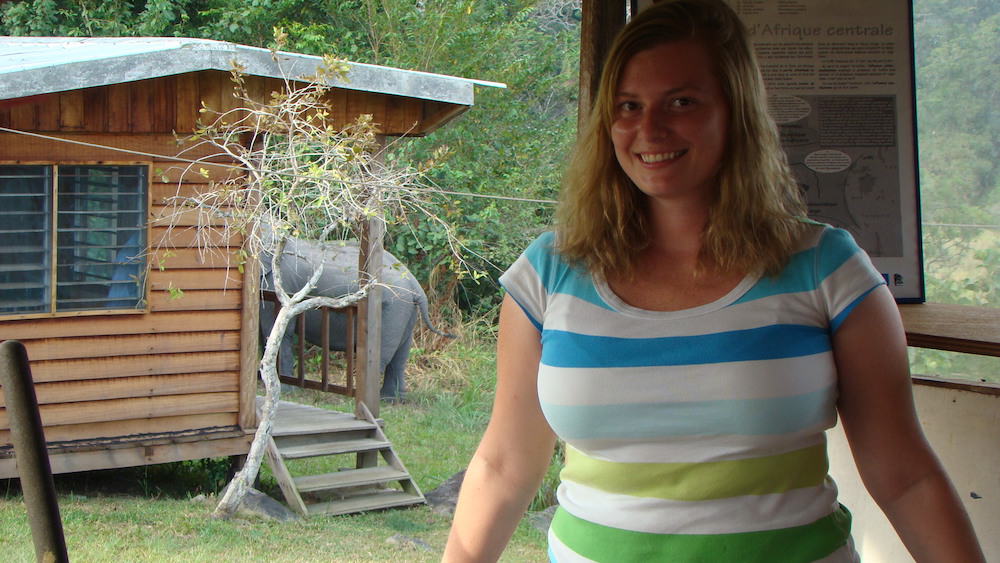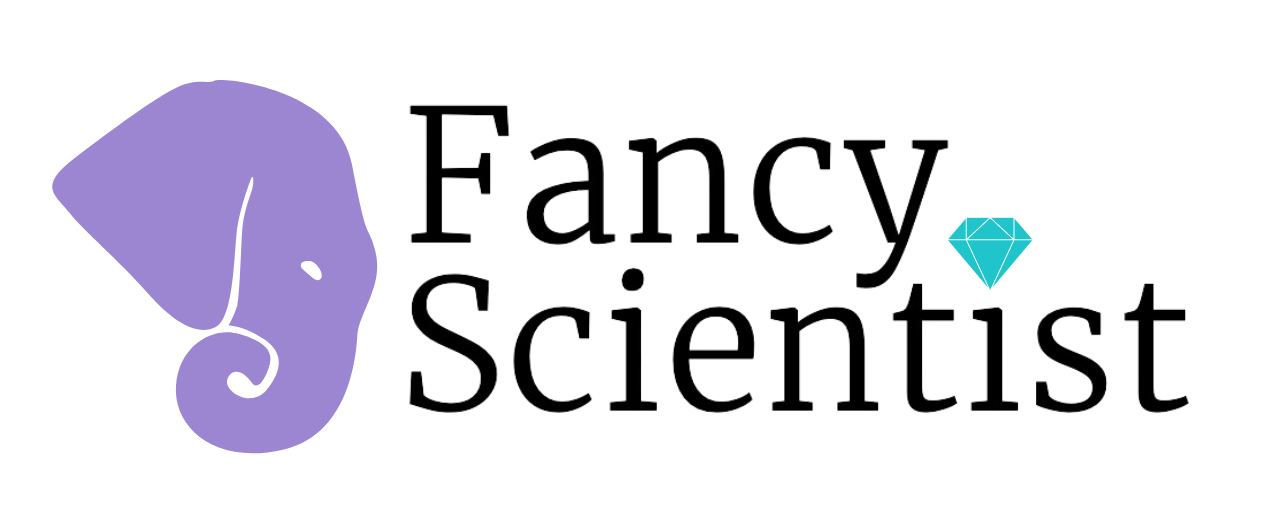I studied African forest elephants for my Ph.D. and have given many presentations on my research and their behavior. At these presentations and in an “Ask Me Anything” event for Reddit, I’ve been asked some great questions! Below I’ve aggregated the questions regarding elephant welfare with my answers to them.
Let me know if you have a question by posting in the comments below.

Can you ethically ride an elephant?
No. Elephant rides are inhumane and I am against them. These elephants are trained through the use of a bullhook, which is a wooden pole with a pointy end.
Elephant trainers claim it does not hurt the elephant, but that they just gently “guide” the elephant. If this were true, they could use another instrument that did not have a sharp end. Yet when people try to ban the bullhook, there is a lot of opposition from circuses and other places with elephant rides.
Asian elephants are weird because they are “tame” not domesticated. In other words, they are not bred for thousands of generations to live alongside humans. Captive elephants are still taken from the wild and the have to go through a process in order for them to be tame to humans. I am personally against this and the elephant riding industry because I think this process is too invasive and inhumane.
Many zoos are moving towards or have moved to a protected contact policy where elephants and humans do not directly interact with one another. I used to work at Disney’s Animal Kingdom and the zookeepers now train the elephants (for medical purposes) behind a barrier. The elephants can end training whenever they want. It is also safer for the zookeepers!
What is your take on elephant sanctuaries?
You have to be really careful about places that call themselves “sanctuaries.” A true sanctuary does not let you touch animals UNLESS they have an animal that cannot be released to the wild for some reason. But those are usually rare cases.
A sanctuary where you can touch lots of animals (especially babies) are likely not a real sanctuary and just a business for tourists and ultimately bad for the animals. There are many sham elephant sanctuaries that let you pose with animals for photos to paste to social media. Whenever I travel, I do research on places that have animals before I visit. Many do harm rather than good.
I visited an elephant sanctuary. I was disgusted by what I saw and left. Is there any way to report these to the authorities?
I am not sure of any official source, but you can post pictures on TripAdvisor and try to discourage tourists from visiting. Most tourists care about elephant welfare and are tricked into thinking these sanctuaries are really saving elephants when they are actually using the animals for elephant tourism.
How would you rate the Elephant Sanctuary in Tennessee?
Very highly! They are a fantastic organization that prioritizes elephant welfare. We have “adopted” elephants frequently from this sanctuary as Christmas gifts for my mom.
They have a lot of space for their elephants and visitors are not allowed to interact with the elephants. I even think it is closed to visitors completely to allow the elephants to truly live out the rest of their lives as free as they can.
Are there any sanctuaries you recommend besides the one in Tennessee?
PAWS (Performing Animal Welfare Society) has an ethical sanctuary that houses elephants too.
The David Sheldrick Wildlife Trust is another famous organization, but technically they are an orphanage, not a sanctuary. The difference is that they find young, orphaned elephants and rhinos and release them into the wild when they are old enough. In sanctuaries, the animals cannot be released. They are usually former circus or zoo elephants.
David Sheldrick is a great organization and has done a lot for elephant conservation, but they do allow visitors to sometimes interact with the elephants, which I am not a fan of because I think it sends mixed messages.
In the United States, which zoos have the best facilities for elephants?
I do not know which has the absolute best; I haven’t researched this or visited all zoos. I know that Disney’s Animal Kingdom does a good job and the North Carolina Zoo also does because they have A LOT of space. More space is really important for elephant welfare as they are the largest terrestrial animal.
I have never visited the San Diego Zoo, but they have a lot of research devoted to captive and wild animals so I would not be surprised if their elephant exhibits had excellent care.
Is it ethical to teach elephants tricks for amusement?
It is NOT ethical to teach elephants to do tricks solely for human enjoyment. Elephants are trained using a bullhook, which is a heavy pole with a sharp metal end. Elephant trainers say that they use this pole to gently “guide” the elephant, yet when people try to ban it, they are against the ban. If it was really a gentle guide, they would not need a sharp, metal end.
In reputable zoos, elephants are taught to do”tricks” for medical purposes only. For example, they will train elephants to present an ear because so vets can draw blood from it when they need medical information. These tricks are reward-based and are meant to minimize any stress that would be caused by physical examinations or prevent the use of anaesthesia.
Do elephants get stressed out/depressed when they live in zoos?
Yes, absolutely. Animals that are stressed or depressed will exhibit non-natural behavior or repeated behaviors (like pacing or head bobbing). There is a lot of pressures on zoos today to either release their elephants to sanctuaries or to expand elephant enclosures.
Some scientists think it is unethical to hold elephants in captivity because of how social they are in the wild and how much area they use. Other scientists think it’s important for elephants to be seen by the public to act as “animal ambassadors” for those in the wild. If people don’t see elephants, they might not care if they go extinct.
The good news is that elephants are not taken from the wild anymore for zoos (at least in the US). Zoos now try to captivity breed them. However, it’s really difficult to breed them in captivity and no one really knows why.
Can zoos decrease stereotypic behaviors without enlarging enclosure space?
Yes. Zoos can give elephant and other animals “enrichment,” which describes enhancements to their enclosures that encourage behaviors they would naturally do in the wild. For example, elephants love water so giving them pools or other water features to use would help.
When I worked in Disney’s Animal Kingdom, they designed a giraffe feeder to mimic the natural foraging behavior of leaves on African trees rather than just giving them food. Elephants also like to dig with their tusks (in the wild to get minerals) so some zoos have mounds built up where they can do this.
Do you think lawmakers will ever make it illegal for circuses to have elephants?
I do! I am very hopeful. There is growing pressure from the public and scientists to improve the lives of captive elephants in general. More and more people are knowledgeable about elephant welfare now.
Circuses are particularly bad. They cannot train the elephants without abusing them.
If you watch the trainer, they always use a bullhook, which is a pole with a point end. Advocates of elephant welfare have tried to ban the bullhook, but circuses are against it. They claim it does not hurt the elephant, but that they just gently guide the elephant. If this were true, they could use another instrument that did not have a sharp end.
I think it is just a matter of time for people to stop going to animal circus. They will either be illegal or unsupported financially. I was really happy when Ringling Brothers announced they would no longer have elephants. This was a BIG move forward.
I am not against circuses, only the use of animals in circuses. There are great non-animal circuses available for entertainment.
Love this post? Share it with friends!



